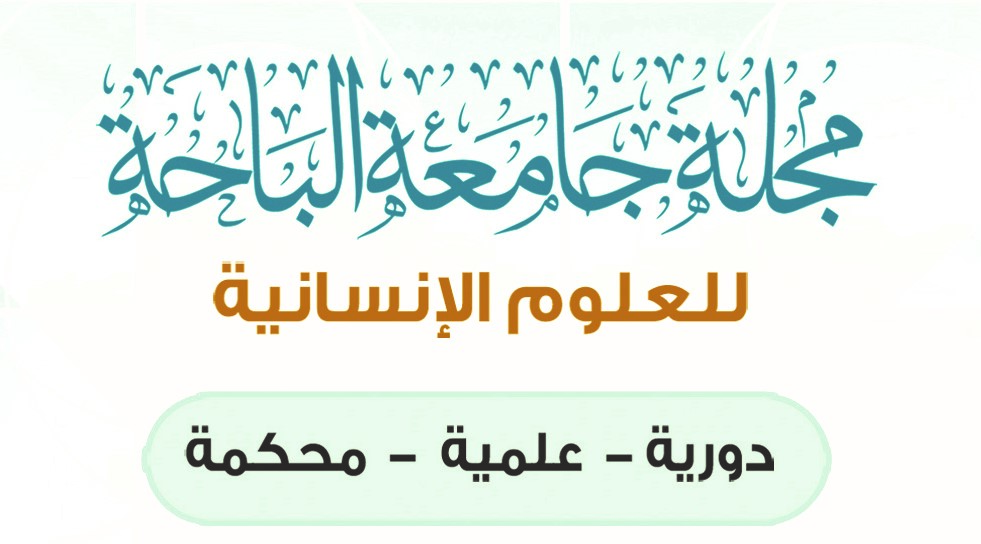Contextual Formation and Its Implications in the Poetic Text: The Poem " Rakaa Fi Mihrab Ummi (A Prayer in the Worshipping Place of My Mother)" by the Poet Salih Al-Zahrani - as a Model
- Dr. Sari ibn Mohammed Al Zahrani
- Reseived: 21/5/2023 Received in Revised Form: Accepted: 5/10/2023
-
This research discusses, with criticism and analysis, the contextual formation and its implications in the poem "Rakaa Fi Mihrab Ummi (A Prayer in the Worshipping Place of My Mother)" by the poet Salih ibn Saeed Al-Zahrani. Beginning with the contextual formation of the word and the associated subjective context, related antecedents and suffixes, the grammatical dimension (the word's time or place), and the juxtapositional context. The research also addresses the contextual formation of the sentence and its related structural levels, according to the axis of integration, predicates, and the structural unit, in addition to discussing the context of artistic images through two levels: the first, the signifying context, and the second, the contextual signifier. The research concludes with the study of the significance of the totality of the text, whether it is an explicit or implicit sign. The research concluded that the contextual formation with its multiple levels in the poem "Rakaa Fi Mihrab Ummi (A Prayer in the Worshipping Place of My Mother)," whether it was an individual, synthetic, or figurative context, had an impact on enriching the text with meanings, connotations, and revelations. This led to revealing the overall significance of the poetic text.
Evidence of Contemporary Scholars from the Sunnah about Purity and Prayer in Light of the Corona Epidemic
- Dr. Mohamed Abdul Razak Aswad
- Reseived: 4/5/2023 Received in Revised Form: Accepted: 5/10/2023
-
The research aims to clarify the opinions of scholars and mention their evidence from the Prophetic Sunnah about purity and prayer in light of the Corona epidemic. The research method is summarized by following an inductive and analytical approach, and the research consists of an introduction, a preface, two chapters, a conclusion, recommendations, and an index of sources. The references are as follows: The introduction includes the importance of the research, the reasons for choosing it, its problem, its objectives, previous studies, its limits, its methodology, its procedures, and its plan. The preface: Introducing the search terms (pandemic, coronavirus, purity, prayer, and the Sunnah) in the Arabic language and the Sharia, and the first topic: evidence of contemporary scholars from the Prophetic Sunnah about purity in light of the coronavirus epidemic, and the second topic: evidence of contemporary scholars from the Prophetic Sunnah about prayer. In light of the Corona epidemic, then the conclusion, recommendations, and index of sources and references.
The story of the Prophet of Allah Lot, peace be upon him, in Chapters of Hud and Al-'Ankabut: A Study in Context and Compose
- Dr. Mansour Abdulaziz Almehawes
- Reseived: 19/1/2023 Received in Revised Form: Accepted: 28/10/2023
-
This study deals with the method of presenting the discourse of Lot's story, peace be upon him, in the two chapters of Hud and Al-'Ankabut, and its diversity in context and compose. The study came in two sections: the first one deals with the two types of context, general and specific. The second section deals with compose, with a focus on the differences in the way the story is presented in the two chapters. In these two sections, it was established that the story in the two chapters possesses an inexhaustible semantic stock, and is characterized by its own diversity, which gives it distinction from other stories in the Qur’an.
Is Idraj (Insertion in the Text of Hadith) in the Two Shaykhs a Significant Problem? An Applied Study on Selected Hadiths from the Two Sahihs
- DR. FATIMA HAMMDI MOHAMED ALSALMI
- Reseived: 17/1/2023 Received in Revised Form: Accepted: 29/10/2023
-
Idraaj (insertion in the text of Hadith) in any Hadith may cast doubt on its authenticity, according to scholars of Hadith. However, both Imam Bukhari and Imam Muslim included narrations with Idraaj in their Sahih books without casting doubt on the authenticity of their narrations. This study sheds light on the methods employed by the two sheikhs in including narrations with Idraaj and explores the techniques they used in presenting these included Hadiths, based on selected examples from their Sahih books.
The Extent Commitment of Industrial Companies in Kingdom of Saudi Arabia to Applying Social Responsibility Accounting: An Exploratory Study
- Jafar Othman El Sharif Abdulaziz
- Reseived: 6/1/2023 Received in Revised Form: Accepted: 20/11/2023
-
The current study aimed to identify the commitment of industrial companies in the Kingdom of Saudi Arabia to applying social responsibility accounting from the perspective of external auditors in the audit offices of the Kingdom of Saudi Arabia. To achieve the study objectives, a descriptive-analytical method was used, and a questionnaire was the main study tool, which was distributed to a sample of 158 external auditors. The study concluded several results, including that the sample agreed on the commitment of industrial companies in the Kingdom of Saudi Arabia to applying social responsibility accounting to owners and employees to a medium degree, to the local community in a low degree, to the environment in a low degree, and to consumers and competitors in a moderate degree. Finally, industrial companies in the Kingdom of Saudi Arabia are applying social responsibility accounting related to regulations, legislation, and social pressure groups to a very low degree. The study recommended the need to find a specific and accurate concept that describes the nature of social responsibility accounting in industrial companies in the Kingdom of Saudi Arabia, develop accounting systems in those companies to ensure measuring the cost of social activities, and disclose them in reports and financial statements.
The hadiths mentioned in the funeral prayers
- Dr. Sultan Othman
- Reseived: 29/4/2023 Received in Revised Form: Accepted: 14/12/2023
-
This research is concerned with defining the funeral, explaining the virtue of praying over it, its ruling, its description, and the supplications contained therein. It is mentioned in the funeral prayer on the authority of the Prophet, may God’s prayers and peace be upon him, and the importance of supplication in the funeral prayer, as it is its essence and core for which it was prescribed, and the importance of taking care of knowing what is authenticated about the Prophet, may God’s prayers and peace be upon him, and what is not true about him in the matter of supplication. And what is not valid is a supplication from among the supplications, and it is permissible to supplicate for what was not authenticated on the authority of the Prophet, may God’s prayers and peace be upon him, at the funeral, provided that it is not believed that it is proven on the authority of the Prophet, may God’s prayers and peace be upon him.
The great jurisprudence of the Sunnah in seeking refuge in Allah from the accursed Satan: a modern objective study
- Dr. Sami ibn Ahmad ibn Abdulaziz Al-Khayat
- Reseived: 30/9/2023 Received in Revised Form: Accepted: 23/12/2023
-
Islam encourages Muslims to seek Allah's protection from Satan's temptations. The Prophet educated his followers about defending against Satan's attempts to deviate humanity. This protection involves turning to Allah for refuge, a practice deeply rooted in Islamic traditions. These traditions contain numerous supplications emphasizing seeking Allah's shield against worldly and otherworldly harms. Recognizing its importance, scholars have extensively discussed these supplications in their writings. The study focused on authentic narrations that underscored seeking Allah's refuge from Satan. These highlight fifteen specific scenarios for seeking refuge, such as during doubts, mosque entry and exit, prayers, anger, certain animal sounds, intimate moments, exorcisms, daily remembrances, unsettling dreams, and death's approach. Fundamentally, seeking refuge is an act of supplication, acknowledging only Allah's power to benefit or harm. Following this prophetic guidance is crucial for personal and societal well-being.
Movement and Stillness in Sufism Critical Analytical Study
- Dr. sulaeman abn abdalazeez abn salih alrbaie
- Reseived: 11/9/2023 Received in Revised Form: Accepted: 12/11/2023
-
One of the essential cognitive methodological approaches to the study of Sufism is the observation of the presence of influential subjective components in its issues, and they are steadily increasing in importance in the main fields under which these issues fall. The duality of movement and stillness is one of the most influential and steady components of Sufism, if not the most prominent one. It influenced the concepts and meanings related to the Sufi lexicon, as it is one of the determinants of behavior and the scales of conditions and stations for them, and it represents the pillar of etiquette and rules by which Sufism tests the will of the aspirant in the method.


